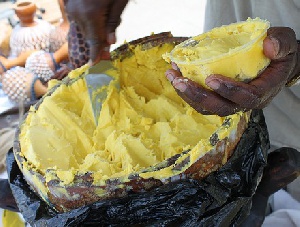Ghana plans to block shea exports by companies not registered with the government, tightening control of an industry that largely relies on women to harvest the product used in moisturizers and food.
Shippers have to sign on with the Ghana Cocoa Board by the end of the month or face a ban, said Vincent Anchirinah, manager of the regulator’s shea unit. The board is also starting a program to develop higher yielding trees and make harvesting, that currently takes place in the wild, less risky and burdensome, he said in an interview Monday in the capital, Accra.
“If you can get a situation where somebody has some trees so she doesn’t need to get up at 4 a.m. and be competing with snakes in the bush, she can sleep, knowing she has 10 or 20 trees which can give her what she wants,” Anchirinah said.
The regulator of cocoa, Ghana’s biggest cash crop, is stepping into the shea industry to allow the 500,000 to 600,000 women who pick the nut in the north of the West African nation to earn more from their products, according to Anchirinah.
Demand is growing in Europe, North America and Asia as companies such as L’Oreal SA’s The Body Shop sell lotions and soaps made from the commodity, while Wilmar International Ltd. processes it for food flavoring.
Ghana is the third-biggest producer of shea nuts, which grow in West Africa, according to the United Nations Food and Agriculture Organization. Output reached 73,500 metric tons in 2012, FAO data show. Nigeria and Mali are the largest producers.
While 27 exporters of shea nuts or butter have registered since 2011, there are many yet to adhere, Anchirinah said, without giving details.
A project funded by the state-owned Export Trade, Agricultural and Industrial Development Fund to cultivate shea trees will start this year, he said. The fund is providing 3.4 million cedis ($960,000) to nurse 1 million trees over two years.
At least 5 acres (2.2 hectares) in each of Ghana’s three northern regions will be cultivated with seedlings in development at a nursery in the village of Daboya, he said. The farms will take five to six years to start producing nuts, compared with 20 to 25 years for trees grown in the wild.
Ghana, which is the world’s largest producer of cocoa after Ivory Coast, plans to set up an independent shea board by 2023, he said. It will regulate the industry, including setting pricing and rules for marketing, he said.
Bringing the industry under closer government control may help the women who traditionally harvest the nuts for domestic use as a cooking oil, according to Anchirinah.
In Ghana’s three northern regions, poverty rates based on the number of people who can meet a daily cost of living of 3.60 cedis averaged 55 percent, more than double the national figure of 24 percent, according to 2013 data from the Ghana Statistical Service.
“The government’s concern is the women in the village,” Anchirinah said. “The industry is not helping the poor women who pick the nut.”
Click to view details



Business News of Thursday, 12 March 2015
Source: bloomberg.com
Ghana to curb shea exports to control beauty product
Entertainment
















